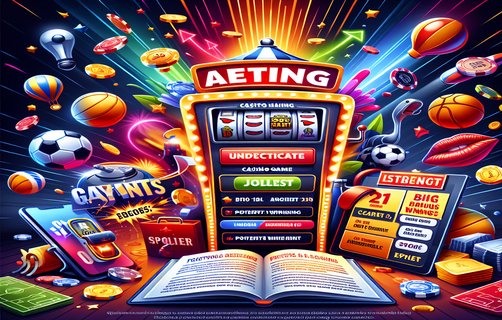The Art of Betting: Strategic Insights for Poker Enthusiasts
पत्ते खेलने की कला: पोकर प्रेमियों के लिए रणनीतिक अंतर्दृष्टि
Poker isn't simply a card game; it's a battle of wits, strategy, and psychological prowess. As players shuffle their decks and anticipate their opponents' moves, understanding the nuances that govern the game's dynamics becomes vital. First, a comprehensive game overview sets the stakes: poker variants like Texas Hold'em and Omaha offer different play styles and depth, catering to diverse skill levels and preferences. In both, the cards dealt define the initial landscape of the game, but the players' actions ultimately chart the course of victory.
Error control guidelines form the backbone of strategic thinking in poker. Players must develop the ability to recognize and mitigate their errors while capitalizing on their opponents' missteps. Maintaining a clear head and quickly adapting to the fluid dynamics of play ensures resilience. One way to refine error control is to engage in analytics—reviewing past hands to identify patterns and blunders can bolster decision making in future games.
Winning probability estimation stands crucial when considering the odds of emerging victorious based on one's hand composition and the community cards laid out. Assessing pot odds against the likelihood of hitting a much-needed card can dictate whether to stay in the game or fold. Here, players visualize their potential successes, weighing risks against rewards in every round, fostering an environment where informed decisions replace hasty plays.
Bonus planning adjustment is another intricate facet of the poker strategy. New players may find promotional offers alluring, but discerning the intricacies of wagering requirements and bonus percentages is paramount. Strategic adjustment can turn these bonuses into real profit, but only if players invest time to understand the terms associated and how to best exploit them.
Central to successful gameplay is the concept of clear thoughts. Players operate best when they can strip away noise—internal anxiety and external distractions—enabling laser-focused decision-making. A mental warm-up, akin to a pre-game routine, can be beneficial. Meditation or visualization might help to sharpen one's focus before engaging in high-stakes environments, creating space for clearer reasoning and sound strategies.
Bluffing, a quintessential element of poker, taps into psychological acumen and risk assessment. Successful bluffs rely on understanding your opponents’ tendencies and tailoring your actions to fit the narrative of strength. When gauging whether to bluff, factors like table dynamics, player psychology, and position all serve as vital indicators. A well-timed bluff can shift the balance of power at the table, sending adversaries into uncertainty while positioning oneself for an advantageous move.
In conclusion, the poker arena is an electrifying battleground requiring a blend of strategic oversight, error management, and psychological insight. By focusing on understanding game mechanics, estimating probabilities, managing bonuses, asserting mental clarity, and judiciously applying bluffing strategies, players can elevate their game and enhance their potential for success.

पोकर केवल एक कार्ड खेल नहीं है; यह चतुराई, रणनीति, और मनोवैज्ञानिक कौशल की लड़ाई है। जैसे-जैसे खिलाड़ी अपने डेक को शफल करते हैं और अपने प्रतिद्वंद्वियों की चालों की अटकल लगाते हैं, खेल की गतिशीलता को प्रभावित करने वाले सूक्ष्म पहलुओं को समझना महत्वपूर्ण हो जाता है। सबसे पहले, एक व्यापक खेल अवलोकन दांव निर्धारित करता है: टेक्सास होल्ड'एम और ओमाहा जैसे पोकर के विविधताओं में विभिन्न खेलने की शैलियाँ और गहराई होती हैं, जो विभिन्न कौशल स्तरों और प्राथमिकताओं को पूरा करती हैं। इन दोनों में, कार्ड जो dealt होते हैं प्रारंभिक परिदृश्य को परिभाषित करते हैं, लेकिन खिलाड़ियों की कार्रवाई अंततः जीत का मार्ग प्रशस्त करती है।
त्रुटि नियंत्रण दिशानिर्देश रणनीतिक सोच की रीढ़ बनाते हैं। खिलाड़ियों को अपनी त्रुटियों को पहचानने और कम करने की क्षमता विकसित करनी चाहिए जबकि अपने प्रतिद्वंद्वियों के मौके का लाभ लेने की कोशिश करते हैं। एक स्पष्ट सिर बनाए रखना और खेल की तरल गतिशीलताओं के अनुसार तेजी से अनुकूलित करना स्थिरता को सुनिश्चित करता है। त्रुटि नियंत्रण को सुधारने का एक तरीका विश्लेषण से जुड़ना है- पिछले हाथों की समीक्षा करके पैटर्न और गलतियों की पहचान करने से भविष्य के खेलों में निर्णय लेने में सुधार किया जा सकता है।
जीतने की संभाव्यता का अनुमान लगाना बहुत महत्वपूर्ण है जब खिलाड़ी अपने हाथों के आकार और सामुदायिक कार्डों के लेआउट के आधार पर विजयी बनने की संभावना पर विचार करते हैं। पॉट के अवसरों का मूल्यांकन और यह देखने के लिए कि किसी आवश्यक कार्ड को हिट करने की संभावना क्या है, यह तय कर सकता है कि खेल में बने रहना है या फोल्ड करना है। यहां, खिलाड़ी अपनी संभावित सफलताओं की कल्पना करते हैं, प्रत्येक दौर में जोखिमों के मुकाबले पुरस्कारों का वजन करते हैं, जिससे ऐसा वातावरण बनता है जहां सूक्ष्म निर्णय हड़बड़ायुक्त खेलों को प्रतिस्थापित करते हैं।
बोनस योजना समायोजन एक और जटिल पहलू है जो पोकर रणनीति में शामिल है। नए खिलाड़ी प्रोमोशनल ऑफ़र्स को आकर्षक पा सकते हैं, लेकिन वेटिंग आवश्यकताओं और बोनस प्रतिशतों की जटिलताओं को समझना अत्यंत आवश्यक है। रणनीतिक समायोजन इन बोनस को वास्तविक लाभ में बदल सकता है, लेकिन केवल तभी जब खिलाड़ी उन शर्तों को समझने में समय लगाते हैं जो इसके साथ होती हैं और उन्हें सबसे अच्छी तरह से प्रभावित करने के लिए।

सफल गेमप्ले के केंद्रीय तत्वों में से एक स्पष्ट विचारों का अवधारणा है। खिलाड़ी तब सबसे अच्छे काम करते हैं जब वे शोर को हटा सकते हैं—आंतरिक चिंता और बाहरी विक distractions—निर्णय-निर्माण में लेजर-फ़ोकस सक्षम बनाते हैं। एक मानसिक वार्म-अप, जैसे पूर्व-खेल दिनचर्या, फायदेमंद हो सकता है। ध्यान या दृश्यता तैयार करना उच्च-दांव वाले वातावरण में शामिल होने से पहले ध्यान केंद्रित करने में मदद कर सकता है, स्पष्ट तर्क और ठोस रणनीतियों के लिए स्थान बना सकता है।
ब्लफिंग, जो पोकर का एक अनिवार्य तत्व है, मनोवैज्ञानिक क्षमता और जोखिम मूल्यांकन में टैप करता है। सफल ब्लफ्स आपके प्रतिद्वंदियों की प्रवृत्तियों को समझने और आपकी कार्रवाइयों को ताकत के नरेटीव से मेल खाने के लिए तैयार करने पर निर्भर करते हैं। यह तय करते समय कि ब्लफ करना है या नहीं, टेबल की गतिशीलता, खिलाड़ी की मनोविज्ञान, और स्थिति सभी महत्वपूर्ण संकेतक होते हैं। एक अच्छी तरह से समय पर ब्लफिंग शक्ति के संतुलन को टेबल पर स्थानांतरित कर सकती है, प्रतिद्वंद्वियों को अनिश्चितता में भेजते हुए खुद को लाभप्रद चाल के लिए स्थान पर रखती है।
अंत में, पोकर का क्षेत्र एक रोमांचक लड़ाई का मैदान है जिसमें रणनीतिक पर्यवेक्षण, त्रुटि प्रबंधन, और मनोवैज्ञानिक अंतर्दृष्टि की मिश्रण की आवश्यकता होती है। खेल की प्रणाली को समझने, संभावनाओं का अनुमान लगाने, बोनस का प्रबंधन करने, मानसिक स्पष्टता को स्थापित करने, और ब्लफिंग रणनीतियों का विवेकपूर्ण उपयोग करने के द्वारा, खिलाड़ी अपने खेल को ऊंचा कर सकते हैं और सफलता की संभावनाओं को बढ़ा सकते हैं।

comments
AceHunter
This analysis is spot-on! Understanding opponent psychology is crucial.
PokerPro88
Great tips on error control! I often overlook that.
BluffMaster
The section on bluffing had some killer insights! Gonna try them in my next game.
BettingWizard
Really enjoyed the breakdown of bonus planning. That's often a hidden strategy.
CardShark
Excellent article! Wish I had this knowledge when I started playing.
AllInDan
Clear thoughts make such a difference. I often get too emotional at the table.